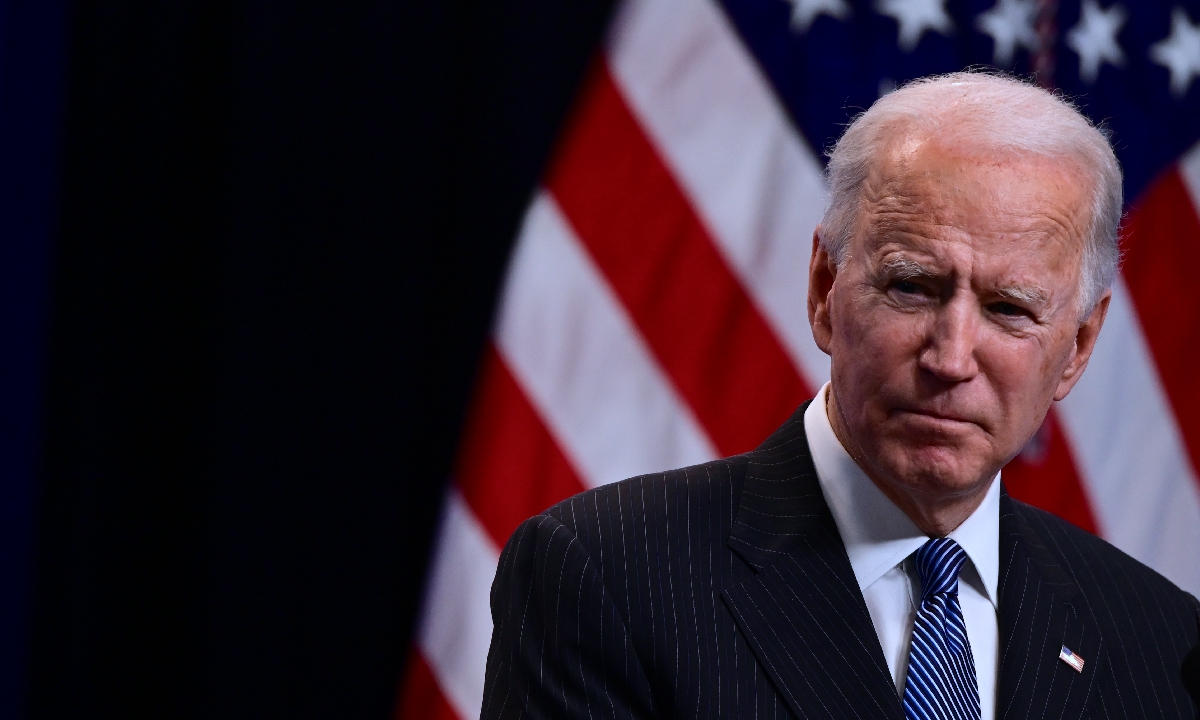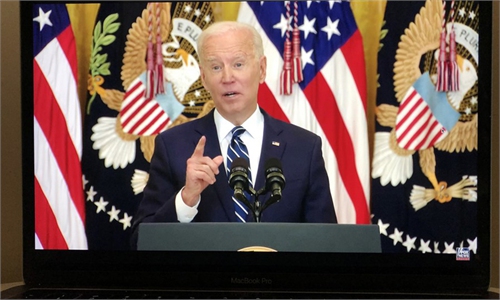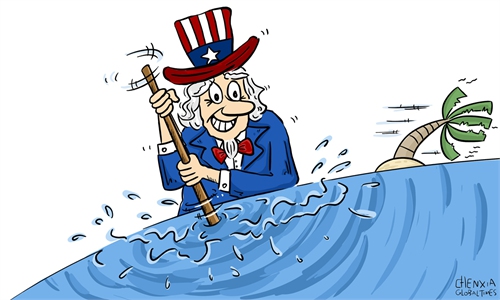Biden extends Trump's China policy, more predictable yet more chill: Global Times editorial
It will soon be the 100th day since Joe Biden took office. Traditionally, this marks a point to assess the performance of the new president in the first 100 days in office. The US public opinion believes the top four priorities of the Biden administration are the COVID-19 fight, economy, climate change and addressing racial injustice. Biden earned a 52 percent approval rating. Some say that this rating is not bad, while some point out that this is the third-lowest of any president since 1945, only higher than Donald Trump and Gerald Ford.
It is worth noting that Biden's approval rating has been stable. And his achievement in quickening the pace of vaccinations in the US has failed to give Biden a higher rating. This shows that US society is severely divided, and that the division has solidified.
Chinese people care more about how Biden implemented his China policy in these 100 days. Some have the reason to feel greatly disappointed about him while others think he is barely satisfactory. Biden administration's China strategic definition is apparently a continuation of the Trump administration's perception of China. In the past 100 days, strategic competition between the US and China has not diminished. But Biden has changed Trump's manic approach to Beijing. This has created a clearer logic and predictability on the US, and a regular chill has emerged in China-US relations.
Not unexpectedly, the Biden administration has inherited Trump's tariff policy toward China. They have imposed sanctions on seven Chinese supercomputing companies. However, it is a bellwether of future possible moves of the US. It can be seen as a declaration that the Biden administration will not reverse policy in terms of technology decoupling. The process of technological decoupling between the two countries will only speed up in the future. We cannot harbor any illusions.

US President Joe Biden answers questions from the media after signing a "Made in America" Executive Order in the South Court Auditorium at the White House on January 25, 2021 in Washington.Photo: AFP
While US economic and technological policy toward China continues, the Biden administration has taken the political war against China to new heights. It has mobilized allies to jointly exert pressure on China, and has made some progress. Washington has set a bad example in the West by viciously smearing governance in Northwest China's Xinjiang Uygur Autonomous Region as "genocide." It is now creating a strategic posture to contain China that is no lighter than it was under the previous administration.
But the Biden administration clearly has more scruples than the Trump administration, the approach of the latter was often impulsive and brutal. The new government in Washington advocates competition, cooperation as well as confrontation with Beijing at the same time. It emphasizes building its own strength. Even though a rather complete China strategy has not been formed so far, it has been revealed that the US wants to increase strategic leverage with China by strengthening its own strength.
Washington seems to want to stabilize competition between China and the US for the moment, creating fewer new fronts of substantive confrontation between the two countries so that it can spend some time sorting out its internal affairs and regaining strength to defeat China.
In the future, China and the US will continue their frictions - they may further decouple in technology while maintaining, or even expanding, general economic cooperation. Political conflicts would probably become fiercer, but the two countries are likely to gradually set a clear line between economic and political spheres.
For Chinese people, we must adapt to the new normal of extremely unfriendly vibe between China and the US. It could be frequently seen that the two sides engage in public spat on the diplomatic and public opinion sphere. We can no longer expect China and the US to "mutually respect" each other in politics. That era of mutual respect at least has been over in the short run. The essence of China-US relations is economic cooperation as well as the sharing and exchange of interests. We should discard the illusion, while at the same time we don't have to feel frustrated, angry, or be impulsive. Even if China and the US engage in a war of words, they should make efforts to maintain, and strengthen, the platforms for cooperation and exchange of interests.
The core of China-US competition is the growth speed of each other's strength. For the Biden administration, reinforcing the US strength is key to winning the competition with China. China, in turn, must believe that keeping the momentum of catching up with the US in terms of strength should be the most important part of our US strategy. It's the decisive factor that will crush the US illusion of containing China.
Many US elites used to believe they can quickly destroy China by taking an extreme and quick approach. But now they have realized it's unrealistic after years of trying. That way, the risks will be too big for the US to bear. The US has to resort to a containment strategy in an attempt to gradually suffocate China's development and disrupt the rise of the country. While forming a strong ability to prevent the US from taking adventurous actions, China must be also prepared for strategic competition that has become routine with the US. We cannot allow various dazzling voices and statements of the US to disturb our judgments. They are only of trivial importance. China must develop. This is what the US elites are most afraid of.


